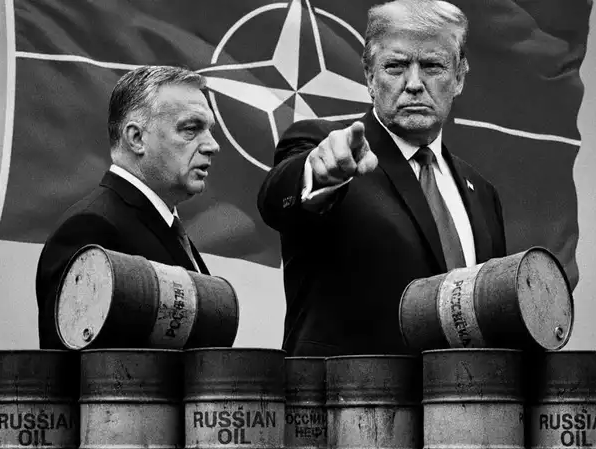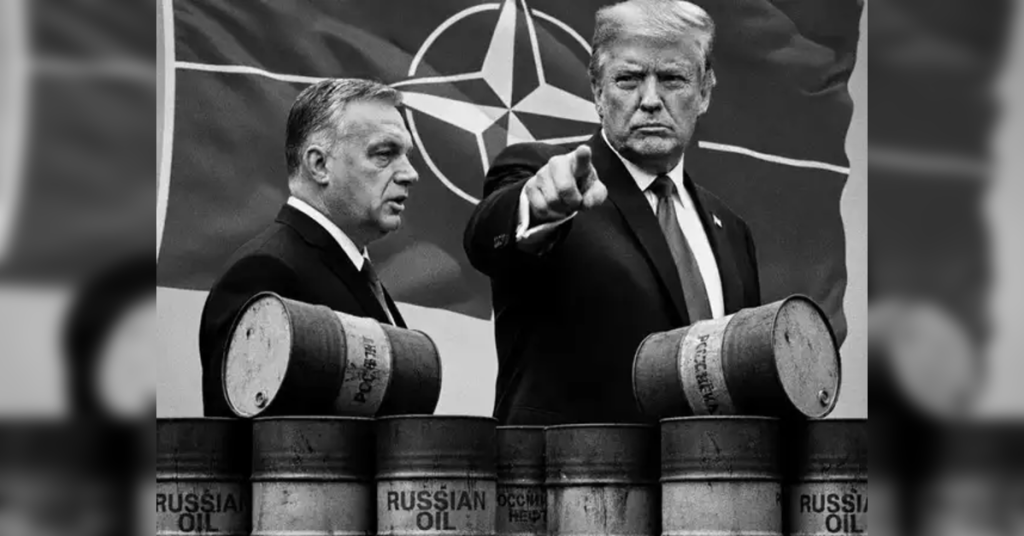
Three years into Russia’s war in Ukraine, one NATO member is still bankrolling the Kremlin in a way that has stunned both Brussels and Washington. Hungary, under Prime Minister Viktor Orbán, now sources more than 80 percent of its crude oil from Russia, making it the most Russia-dependent economy in the alliance.
The irony runs deeper when set against US policy. US President Donald Trump slapped 50 percent tariffs on Indian goods to punish New Delhi for buying Russian oil and weapons. Those duties, among the steepest in the world, included a 25 percent penalty for transactions linked to Moscow, a revenue stream the West insists is fuelling the war in Ukraine.
New Delhi has called the tariffs unfair and insisted it will buy oil wherever it finds the “best deal” to safeguard its 1.4 billion citizens.
Foreign Minister S. Jaishankar has repeatedly argued that energy security cannot be sacrificed for political theatre.
Speaking at a G20 Foreign Ministers’ meeting in South Africa, Jaishankar said: “Peace can certainly enable development, but by threatening development, we cannot facilitate peace. Making energy and other essentials more uncertain in an economically fragile situation helps no one. Therefore, the way out is to move the needle towards dialogue and diplomacy, not in the opposite direction towards further complications.”
Meanwhile, Hungary’s exposure to Russian energy has only deepened. According to a September 2 report from the Atlantic Council, Budapest’s crude imports from Moscow have climbed from 61 percent on the eve of the invasion to 86 percent today.
Its neighbour Slovakia is even more reliant, drawing almost all of its crude from Russia. Both countries also remain tethered to Moscow through the TurkStream pipeline, keeping natural gas supplies flowing despite the European Union’s 2022 pledge to phase out Russian fossil fuels altogether.
Trump’s anger at NATO’s weak link
Trump has seized on Hungary’s behaviour as proof of NATO’s lack of resolve. In his address to the United Nations General Assembly earlier this month, he blasted the NATO alliance for what he called self-defeating energy policy.“China and India are the primary funders of the ongoing war by continuing to purchase Russian oil. But inexcusably, even NATO countries have not cut off much Russian energy and Russian energy products … I found out about it two weeks ago, and I wasn’t happy,” Trump said.
He went further: “They’re funding the war against themselves. Who the hell ever heard of that one?”
Trump has long insisted that sanctions against Moscow mean nothing without a united front. On Truth Social, he declared: “I am ready to do major Sanctions on Russia when all NATO Nations have agreed, and started, to do the same thing, and when all NATO Nations STOP BUYING OIL FROM RUSSIA.”
For Trump, Hungary’s deals with Moscow are not just an irritant but a fundamental betrayal of NATO’s purpose.
Hungary’s defence
Budapest insists it has little choice.
Foreign Minister Péter Szijjártó argues the country is locked into Soviet-era infrastructure. “For us, energy supplies are a purely physical question,” he said in New York during the UN General Assembly. “It can be nice to dream about buying oil and gas from somewhere [besides Russia] … but we can only buy from where we have infrastructure.”
Hungary’s reliance on the Druzhba (“Friendship”) oil pipeline, which carries five million tonnes of crude each year from Russia, makes Moscow its dominant supplier. Orbán’s government has repeatedly vetoed EU-wide attempts to block Russian imports, claiming that doing so would wreck the country’s energy security.
Choices exist
Independent researchers say Hungary’s dependence is not inevitable.
The Center for the Study of Democracy (CSD) and the Center for Research on Energy and Clean Air (CREA) have both pointed out alternatives.
Crude oil could flow through Croatia’s Adria pipeline, which has spare capacity. Liquefied natural gas could be imported via terminals in Germany, Poland, Italy, or Greece.
Nor is the argument about cost persuasive.
As the Atlantic Council notes, Hungary and Slovakia together have already paid Moscow around $6 billion in tax revenues for crude oil since the invasion began, enough to fund thousands of Russian cruise missiles.
Meanwhile, European Commission data shows that consumers in both countries still pay some of the highest energy prices in the EU.
“This continued reliance on Russia is a choice rather than a necessity,” the Atlantic Council report concludes.
Slovakia edges toward change, Hungary digs in
Slovakia, while still dependent, has signalled openness to change.
Economy Minister Denisa Saková said her government is already in talks with Washington about alternative supply routes. “As long as we have an alternative route, and the transmission capacity is sufficient, Slovakia has no problem diversifying,” she said.
Hungary shows no such flexibility. A major long-term oil contract with Russia expired in June 2025, but the Orbán government has simply kept buying.
Whether through renewal or spot market purchases, the direction is clear: Budapest has no plans to break from Moscow.
Orbán’s political bet
Orbán’s calculus is partly domestic.
With elections looming next year, keeping energy flowing matters more to Hungarian voters than EU unity or NATO discipline. Orbán portrays himself as the defender of household security against Brussels’ “dreamers” and Washington’s pressure.
It is a strategy that has worked before. He has leveraged Hungary’s veto power in Brussels to water down sanctions and extract concessions, burnishing his reputation as the EU’s most obstinate strongman.
But the consequences ripple outward. By buying over 80 percent of its oil from Russia, as per Trump’s logic, t is financing Moscow’s war machine, undermining Western sanctions, and testing NATO solidarity.
Hungary’s leaders say their hands are tied. The evidence suggests otherwise. Budapest has had more than three years to build alternatives. Instead, it has doubled down on Moscow, paying billions that help sustain the largest war in Europe since 1945. For NATO, the uncomfortable truth is that one of its own is keeping Russia’s energy lifeline open.


